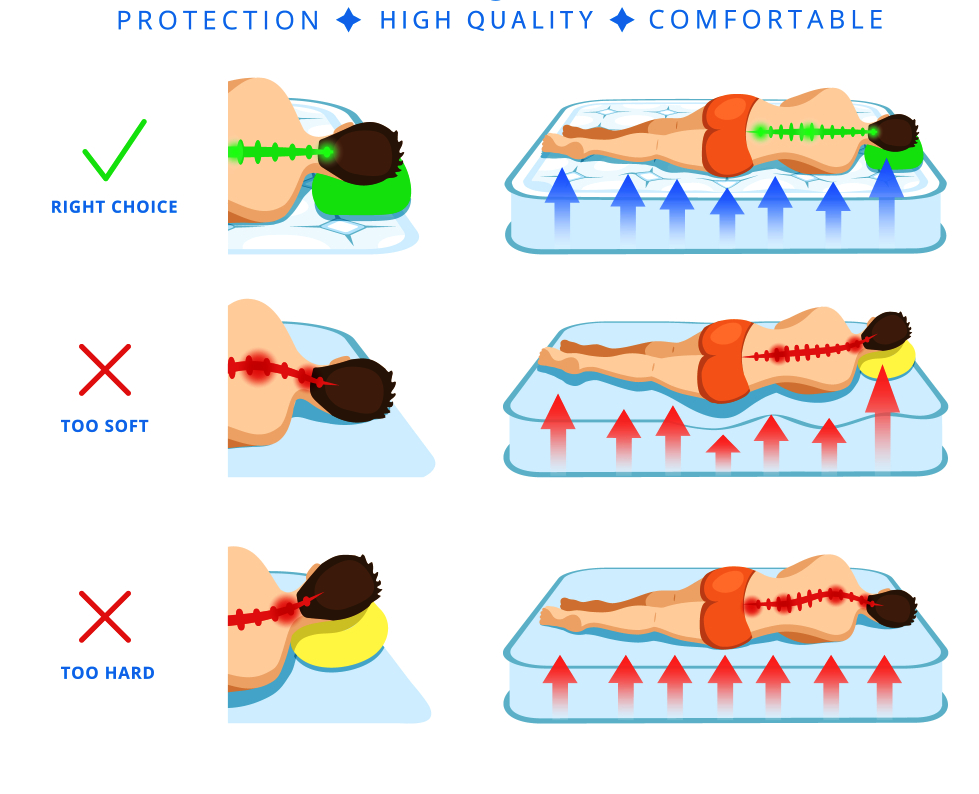When it comes to getting a good night’s sleep, the right mattress can make all the difference. But with so many options out there, how do you know which one is best for your back? Well, let’s have a closer look at memory foam mattresses. Are they good for your back? That’s the burning question we’re going to answer in this article.
Now, I’m sure you’ve heard plenty of opinions on this topic, but let’s dive deeper and separate fact from fiction. Memory foam mattresses have gained popularity in recent years for their unique ability to contour to the shape of your body. They provide a supportive and comfortable sleep surface that can alleviate pressure points and promote spinal alignment. But do they really live up to the hype? Are they truly good for your back? Well, stick around and find out the truth about memory foam mattresses and their impact on your back health.
Are Memory Foam Mattresses Good for Your Back?
Memory foam mattresses are generally considered good for your back. Their ability to contour to your body’s shape helps provide support and relieve pressure points, which can alleviate back pain. Additionally, memory foam mattresses distribute weight evenly, reducing the likelihood of developing discomfort or stiffness. However, it’s important to note that individual preferences and conditions may vary. It’s always best to try out a mattress and consult with a healthcare professional for personalized advice.

Are Memory Foam Mattresses Good for Your Back?
When it comes to getting a good night’s sleep, having a supportive mattress is key. Many people with back pain often wonder if memory foam mattresses are a good option for them. In this article, we will explore whether memory foam mattresses are beneficial for your back and how they can potentially alleviate pain and provide comfort.
The Benefits of Memory Foam Mattresses
Memory foam mattresses are known for their ability to contour to the shape of your body, offering personalized support. This can be particularly beneficial for individuals with back pain. The foam molds to your body’s curves, helping to align your spine and relieve pressure points. By providing targeted support, memory foam mattresses can help alleviate discomfort and promote proper spinal alignment.
Additionally, memory foam mattresses are designed to absorb movement, which can be especially helpful for couples. If one person moves or shifts positions during the night, the other person is less likely to be disturbed. This can lead to a more restful sleep, allowing your back muscles to relax and recover.
Proper Spinal Alignment
One of the key benefits of memory foam mattresses is their ability to promote proper spinal alignment. When your spine is aligned correctly, it reduces the strain on your back muscles and can alleviate pain. Memory foam molds to your body, providing support where you need it most. This helps maintain the natural curvature of your spine, reducing pressure on your discs and nerves.
By properly aligning your spine, memory foam mattresses can help alleviate back pain caused by poor posture or spinal misalignment. Whether you sleep on your back, side, or stomach, memory foam mattresses can conform to your body’s shape and provide the necessary support for a pain-free sleep.
Pressure Point Relief
Memory foam mattresses are known for their pressure-relieving properties. They distribute your body weight evenly, reducing the pressure on specific areas such as your shoulders, hips, and lower back. This can be especially beneficial for individuals with chronic back pain or conditions like arthritis.
When pressure points are relieved, it allows your muscles to relax and promotes better blood circulation. By minimizing the pressure on your back, memory foam mattresses can provide a more comfortable sleep surface and alleviate discomfort.
Factors to Consider
While memory foam mattresses offer numerous benefits for back pain sufferers, there are a few factors to consider before making a purchase. Here are some important considerations:
- Firmness Level: Memory foam mattresses come in various firmness levels. It’s essential to find the right balance of support and comfort for your specific needs. A mattress that is too soft may not provide enough support, while one that is too firm can cause discomfort.
- Temperature Regulation: Some memory foam mattresses may retain heat, which can be uncomfortable, especially for individuals who tend to sleep hot. Look for memory foam mattresses with cooling properties, such as gel-infused foam or breathable covers.
- Quality and Durability: Investing in a high-quality memory foam mattress can ensure its longevity and performance. Look for reputable brands that offer warranties and have positive customer reviews.
Choosing the Right Memory Foam Mattress
When selecting a memory foam mattress, it’s crucial to consider your personal preferences and specific back pain needs. Here are some tips to help you choose the right mattress:
- Test Different Mattress Types: Visit a mattress store or showroom to try out different memory foam mattresses. Lie down on each mattress for at least 10-15 minutes to get a feel for the level of support and comfort it provides.
- Read Customer Reviews: Research customer reviews and ratings online to gain insight into the experiences of others who have purchased the mattress you are considering. Look for feedback from individuals with similar back pain issues.
- Consider Your Sleep Position: Different sleep positions require different levels of support. If you sleep on your back, you may prefer a medium-firm mattress. Side sleepers may benefit from a slightly softer mattress to cushion their shoulders and hips. Stomach sleepers may need a firmer mattress to maintain proper spinal alignment.
In conclusion, memory foam mattresses can be a good option for individuals with back pain. They offer personalized support, promote proper spinal alignment, and relieve pressure points. However, it’s essential to consider factors such as firmness level, temperature regulation, and quality when selecting a memory foam mattress. By choosing the right mattress and ensuring proper sleep hygiene, you can improve your sleep quality and potentially alleviate back pain.
Key Takeaways: Are Memory Foam Mattresses Good for Your Back?
- Memory foam mattresses can provide good support for your back by contouring to your body’s shape.
- They help relieve pressure points, reducing the risk of developing back pain.
- Memory foam mattresses are recommended for people with chronic back pain or spinal issues.
- They can improve spinal alignment, promoting proper posture during sleep.
- However, it’s important to choose the right firmness level to ensure optimal back support.
Frequently Asked Questions
What are the benefits of memory foam mattresses for your back?
Memory foam mattresses are known for providing excellent support and pressure relief, which can be beneficial for your back. The unique viscoelastic properties of memory foam allow it to contour to your body shape, providing customized support for your spine and reducing the risk of developing pressure points. This can help alleviate back pain and promote proper spinal alignment.
Furthermore, memory foam has the ability to absorb motion transfer, meaning that movements from your partner or pets will be isolated and not disturb your sleep. This can be particularly beneficial if you have a sensitive back and are easily disturbed by movement during the night.
Are memory foam mattresses suitable for all types of back pain?
While memory foam mattresses can offer great support and comfort, it’s important to note that they may not be suitable for all types of back pain. Some individuals with specific back conditions, such as herniated discs or severe spinal stenosis, may require a firmer mattress for better support.
It’s always recommended to consult with a healthcare professional or orthopedic specialist to determine the best type of mattress for your specific back pain needs. They can provide personalized recommendations based on your condition and help you choose the most suitable mattress for optimal comfort and support.
Do memory foam mattresses help with spinal alignment?
Yes, memory foam mattresses can help with spinal alignment. The contouring properties of memory foam allow the mattress to adapt to the natural curves of your body, including your spine. This helps to maintain proper alignment and reduce the risk of developing misalignment-related issues, such as lower back pain or posture problems.
However, it’s important to note that the level of spinal alignment provided by a memory foam mattress may vary depending on its firmness level and thickness. It’s recommended to choose a mattress that offers a balance of support and comfort to ensure optimal spinal alignment.
Can memory foam mattresses relieve pressure points on the back?
Yes, memory foam mattresses are designed to relieve pressure points on the back. The material conforms to the shape of your body, distributing your weight evenly and reducing the pressure on specific areas, such as the hips, shoulders, and lower back.
By reducing pressure points, memory foam mattresses can help alleviate pain and discomfort, allowing you to sleep more comfortably throughout the night. This can be particularly beneficial for individuals who experience chronic back pain or have a tendency to develop pressure sores.
Are there any drawbacks to using memory foam mattresses for your back?
While memory foam mattresses offer numerous benefits for your back, there are a few potential drawbacks to consider. Some individuals may find memory foam mattresses to be too soft or lacking in support, especially if they require a firmer mattress for their specific back condition.
In addition, memory foam mattresses tend to retain heat, which can be uncomfortable for those who tend to sleep hot. However, many modern memory foam mattresses are designed with cooling technologies, such as gel-infused foam or breathable covers, to help regulate temperature and provide a cooler sleep surface.

Is Your Memory Foam Mattress Good for Your Back?
Final Summary: Are Memory Foam Mattresses Good for Your Back?
So, are memory foam mattresses good for your back? Based on the information we’ve explored, it seems that memory foam mattresses can indeed be beneficial for your back health. Their unique ability to contour to your body shape and provide support where needed can help alleviate pressure points and promote proper spinal alignment. This can potentially relieve back pain and improve overall sleep quality.
However, it’s important to note that not all memory foam mattresses are created equal. When choosing a memory foam mattress, look for one that has a medium to firm level of support. This will provide the right balance between comfort and spinal alignment. Additionally, consider factors such as your sleep position, body weight, and any specific back issues you may have. These factors can help guide you in finding the perfect memory foam mattress that suits your individual needs.
In conclusion, memory foam mattresses have gained popularity for their potential to support back health and improve sleep quality. While they may not be the solution for everyone, they are definitely worth considering if you suffer from back pain or want to prevent it in the future. Remember to do your research, try out different options, and consult with a healthcare professional if needed. With the right memory foam mattress, you can enjoy a good night’s sleep and wake up feeling refreshed and rejuvenated, ready to take on the day with a healthy back.
